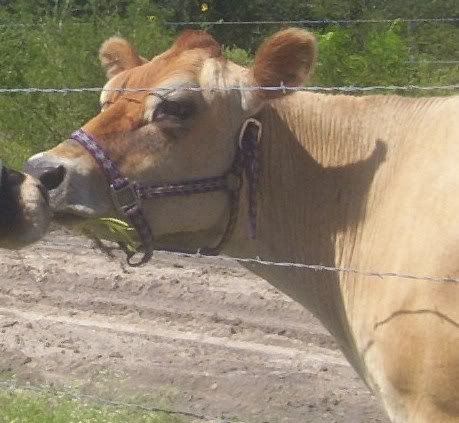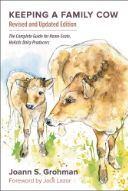Post by Tammy on Sept 15, 2009 8:14:00 GMT -5
www.newsleader.com/article/20090915/NEWS01/90914016/Salatin-wins--100-000-environmental-award-from-Heinz-Foundation&referrer=FRONTPAGECAROUSEL
Salatin wins $100,000 environmental award from Heinz Foundation
Green award honors operator of Swoope's Polyface farm
By Rebecca Martinez/staff • rmartinez@newsleader.com • September 15, 2009
SWOOPE — Nevermind that he was hours away from a fresh round of national attention for his pioneering environmental practices — or the tidy $100,000 that comes with it.
Joel Salatin of Polyface Farms in Swoope hopped in his car Monday to consult with a family of middle-aged siblings who’ve pooled their life savings and want to start a farm.
Salatin, who has written books and gladly works to educate people about better farming practices and buying local food, said these visits rarely lead to the creation of a new, successful farm. People often lack farming knowledge and experience, he said, and many times they’re better off just supporting a farmer by buying his food.
“There’s this cultural stereotype today that farmers are just backward hicks,” Salatin said, somewhat resentful that people who like to buy organic, local produce assume they could just as easily do it themselves. “They’re shoppers, they’re not farmers. And most of them still think farmers are not too bright.”
Still, the growing local food movement has been putting farmers in the spotlight, especially those who, like Salatin, employ innovative and environmentally-friendly farming practices. Lately, Salatin is getting love from authors (Michael Pollan’s “The Omnivore’s Dilemma”), filmmakers (“Food, Inc.”), and most recently, national foundations.
Today, the Heinz Family Foundation announced that Salatin is one of 10 winners of the 15th annual Heinz Awards, which are given in memory of the late U.S. Sen. John Heinz. According to a statement, the award honors innovators, but this year all recipients are “individuals whose achievements have helped bring about a cleaner, greener and more sustainable planet.”
Kim O’Dell of the Heinz Foundation said Salatin’s willingness to teach others about his process of raising non-industrial animals made him stand out to the panel of award judges.
“He’s showing that it is possible to farm in this manner and have healthy food and know at the bottom line that the planet is healthier, the food is more nutritious and at less cost to the environment and human health than the industrial farming that we’re seeing.”
The panel of jurors included former Heinz recipients Paul Anastas of Yale’s Center for Green Chemistry and Director Bruce Katz of the Brookings Institute’s Metropolitan Policy Program.
Salatin said he thinks the Heinz Foundation’s attention is because his Polyface Farms has become a viable commercial farm that actually helps the environment. He said that takes a lot more than just dabbling in compost. His methods aim to mimic the way nature worked before humans interfered with the connections animals and resources normally shared.
Polyface Farms has mobile chicken houses that move around the pastures after the cows, allowing the chickens to eat worms and parasites that could harm cattle when they return to the field. Salatin said the chickens are freer and better-fed than if they were to remain in their own excrement all day. It’s “mob rotation” system has cows eating all the grass in a concentrated area before moving onto another field, which gets the most of the grass and best feeds the cattle. Pigs — not machines — process compost. In 50 years, Polyface hasn’t used chemical fertilizer, and the Organic Matter in its soil has increased by five times.
Winners will each receive a medallion and $100,000 to use as they see fit.
Salatin said he was “in shock” when he heard news of the award.
“Number one, it’s a lot of money, but number two, it’s a prestigious award,” he said, adding that the panel of judges is eclectic and the competition is tough. “It’s humbling. It’s a blessing.”
Salatin said he thinks the Heinz Foundation’s attention is because his Polyface Farms has become a viable commercial farm that actually helps the environment. He said that takes a lot more than just dabbling in compost. His methods aim to mimic the way nature worked before humans interfered with the connections animals and resources normally shared.
Polyface Farms has mobile chicken houses that move around the pastures after the cows, allowing the chickens to eat worms and parasites that could harm cattle when they return to the field. Salatin said the chickens are freer and better-fed than if they were to remain in their own excrement all day. It’s “mob rotation” system has cows eating all the grass in a concentrated area before moving onto another field, which gets the most of the grass and best feeds the cattle. Pigs — not machines — process compost. In 50 years, Polyface hasn’t used chemical fertilizer, and the Organic Matter in its soil has increased by five times.
The awards will be presented at a private ceremony in Washington, D.C., in October
Salatin wins $100,000 environmental award from Heinz Foundation
Green award honors operator of Swoope's Polyface farm
By Rebecca Martinez/staff • rmartinez@newsleader.com • September 15, 2009
SWOOPE — Nevermind that he was hours away from a fresh round of national attention for his pioneering environmental practices — or the tidy $100,000 that comes with it.
Joel Salatin of Polyface Farms in Swoope hopped in his car Monday to consult with a family of middle-aged siblings who’ve pooled their life savings and want to start a farm.
Salatin, who has written books and gladly works to educate people about better farming practices and buying local food, said these visits rarely lead to the creation of a new, successful farm. People often lack farming knowledge and experience, he said, and many times they’re better off just supporting a farmer by buying his food.
“There’s this cultural stereotype today that farmers are just backward hicks,” Salatin said, somewhat resentful that people who like to buy organic, local produce assume they could just as easily do it themselves. “They’re shoppers, they’re not farmers. And most of them still think farmers are not too bright.”
Still, the growing local food movement has been putting farmers in the spotlight, especially those who, like Salatin, employ innovative and environmentally-friendly farming practices. Lately, Salatin is getting love from authors (Michael Pollan’s “The Omnivore’s Dilemma”), filmmakers (“Food, Inc.”), and most recently, national foundations.
Today, the Heinz Family Foundation announced that Salatin is one of 10 winners of the 15th annual Heinz Awards, which are given in memory of the late U.S. Sen. John Heinz. According to a statement, the award honors innovators, but this year all recipients are “individuals whose achievements have helped bring about a cleaner, greener and more sustainable planet.”
Kim O’Dell of the Heinz Foundation said Salatin’s willingness to teach others about his process of raising non-industrial animals made him stand out to the panel of award judges.
“He’s showing that it is possible to farm in this manner and have healthy food and know at the bottom line that the planet is healthier, the food is more nutritious and at less cost to the environment and human health than the industrial farming that we’re seeing.”
The panel of jurors included former Heinz recipients Paul Anastas of Yale’s Center for Green Chemistry and Director Bruce Katz of the Brookings Institute’s Metropolitan Policy Program.
Salatin said he thinks the Heinz Foundation’s attention is because his Polyface Farms has become a viable commercial farm that actually helps the environment. He said that takes a lot more than just dabbling in compost. His methods aim to mimic the way nature worked before humans interfered with the connections animals and resources normally shared.
Polyface Farms has mobile chicken houses that move around the pastures after the cows, allowing the chickens to eat worms and parasites that could harm cattle when they return to the field. Salatin said the chickens are freer and better-fed than if they were to remain in their own excrement all day. It’s “mob rotation” system has cows eating all the grass in a concentrated area before moving onto another field, which gets the most of the grass and best feeds the cattle. Pigs — not machines — process compost. In 50 years, Polyface hasn’t used chemical fertilizer, and the Organic Matter in its soil has increased by five times.
Winners will each receive a medallion and $100,000 to use as they see fit.
Salatin said he was “in shock” when he heard news of the award.
“Number one, it’s a lot of money, but number two, it’s a prestigious award,” he said, adding that the panel of judges is eclectic and the competition is tough. “It’s humbling. It’s a blessing.”
Salatin said he thinks the Heinz Foundation’s attention is because his Polyface Farms has become a viable commercial farm that actually helps the environment. He said that takes a lot more than just dabbling in compost. His methods aim to mimic the way nature worked before humans interfered with the connections animals and resources normally shared.
Polyface Farms has mobile chicken houses that move around the pastures after the cows, allowing the chickens to eat worms and parasites that could harm cattle when they return to the field. Salatin said the chickens are freer and better-fed than if they were to remain in their own excrement all day. It’s “mob rotation” system has cows eating all the grass in a concentrated area before moving onto another field, which gets the most of the grass and best feeds the cattle. Pigs — not machines — process compost. In 50 years, Polyface hasn’t used chemical fertilizer, and the Organic Matter in its soil has increased by five times.
The awards will be presented at a private ceremony in Washington, D.C., in October







